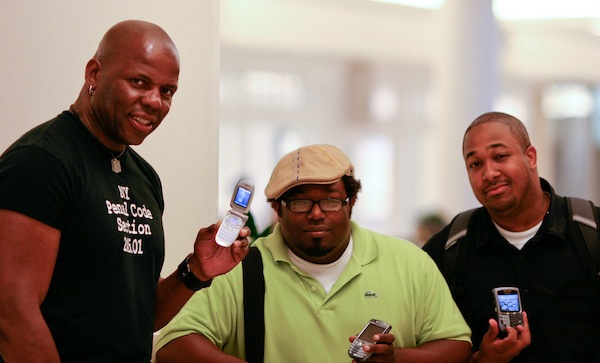
The iPhone moment
Third in a series. Editor's note: To commemorate iPhone's fifth-anniversary, we present several stories looking at its debut and colorful history -- so far.
iPhone is five years old today, and what a half-decade it has been. Apple launched the handset on June 29, 2007, marking its first foray into the cellular device market and with a single carrier: AT&T, which was Cingular before the launch. There were risks all around: Apple leapt into a market of sharks -- Nokia and Research in Motion, namely; AT&T bet the brand on the one device; and iPhone sold, locked and unsubsidized for $499 and $599 -- who would pay unlocked-mobile prices for a device that wasn't? One million people through early September 2007. For these early buyers, and perhaps for bazillion more who followed, iPhone isn't a phone but a cultural phenomenon.

It's a gargantuan war among industry titans and the winners will control everything for years to come
Damn, what an extraordinary month.
Let’s recap. First, we saw a spate of exciting new Ultrabook announcements, along with some x86- and ARM-based Windows 8 tablets at Computex. Then Apple introduced new spins of iOS and OS X for tablets and PCs, respectively, at its developer gathering. Microsoft unveiled Windows Phone 8 at the Windows Phone Summit -- and let's not forget the Surface tablet. And this week, Google rolled out new products and concepts buckshot-style at Google I/O, showcasing its first branded tablet, the Nexus 7, and Android 4.1, just to name a few.
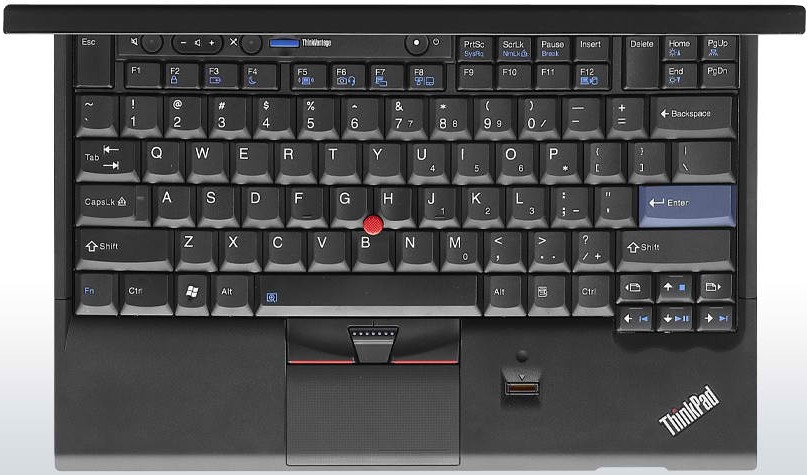
I once was blind but now I see -- or, why I’ll never give up my PC for a tablet and smartphone
Oh man, what a hellish 10 days this has been.
Before we get too far, let me just warn you that when the doorbell rings, this little chat will be over. I don’t care if I’m in mid-sentence. That’s it. Period. End of story.
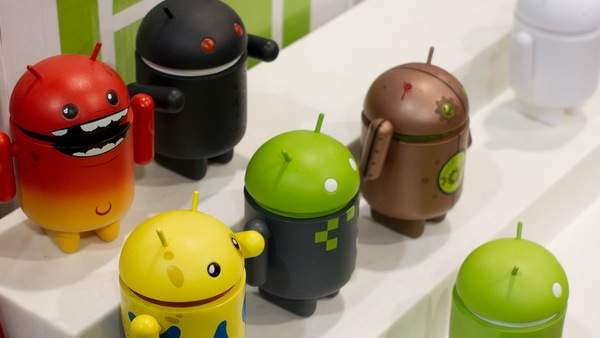
NOW would you buy a Google Nexus tablet?
Google I/O starts tomorrow, and if rumors are right -- and I believe them -- developers get a big peak at the 7-inch Nexus tablet. About a month ago, I asked how much would you pay for one. Now with more details available, I ask if you will buy the Google device.
The Nexus tablet, manufactured by Asus, features a 7-inch IPS LCD display with 1280 x 800 resolution; 1.3 GHz quad-core Tegra 3 processor, 1GB RAM; 1.2-megapixel front-facing camera; near field communications; and Android 4.1 "Jellybean". There are two capacities, 8GB and 16GB, selling for $199 and $249, respectively. This information comes from a leaked training manual that Gizmodo Australia obtained. The big differentiator is price. As I explained in April, "Google isn't trying to save Android tablets but kill Kindle Fire".

Microsoft's road to redemption
Microsoft just put behind it an eventful and positive week, coming off two major announcements on its two major computing platforms -- Windows and Windows Phone: Surface and WP8. Consumer and expert scepticism hobbled much of the excitement, as Microsoft nose dives into paradigm change. Nevertheless, the third week of June 2012 is indicative of a profoundly new direction for Microsoft, characterized by refreshing perspectives and paves a path that leads ultimately in the right direction.
Microsoft is making genuine inroads towards a new strategy that represents a complete paradigm shift from the fundamentals that defined the company and its products over the last couple of decades. The company used to be the antithesis of Apple in practically every sense, selling products based on the abundance of choice as opposed to Apple's strategy of marketing a small hardware lineup. Apple's strategy has always focused on ease of use, simplicity and form; whereas Microsoft, although not neglecting form and aesthetic, put functionality first and foremost and wrapped design around this in the most appealing way possible. The announcements this week represent a fully-committed digression from this strategy from Microsoft.
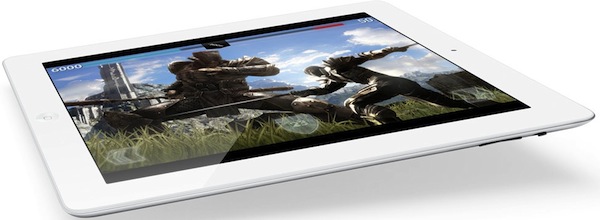
Microsoft and Google won’t have a price advantage with iPad, so they’ll have to actually make a better product
Last week Microsoft kinda-sorta announced its new Surface tablet computer. This week will come a Google-branded tablet. Both are pitted against the mighty iPad. Both companies see opportunity because of what they perceive as a Steve Jobs blind spot. And both companies are introducing tablets under their own brands because they can’t get their OEM’s to do tablets correctly.
For all the speculation about why Microsoft or Google would risk offending hardware OEMs by introducing name branded tablets, the reality is that neither company really had any choice but to make the hardware. In the commodity PC market, no one company is likely to be willing to make the investment necessary to compete with the highly-integrated iPad. Samsung tried, and even then it didn’t pay off for them. Taiwan Inc + Dell just don’t seem to run that way. Furthermore, it is a lot easier to make a product when you control the operating system. You have the experts right there. You don’t have to go through support channels to fix stuff. So ultimately, Microsoft and Google should be able to make much better products than their licensees.
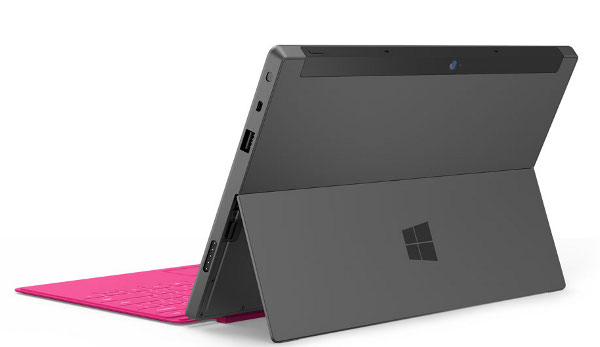
Microsoft Surface is all style and no substance at all
Microsoft’s Hollywood announcement Monday of its two Surface tablet computers was a tactical triumph but had no strategic value for the world’s largest software company because the event left too many questions unanswered. If I were to guess what was on Microsoft CEO Steve Ballmer’s mind it was simply to beat next week’s expected announcement of a Google branded tablet running Android. Microsoft, already playing catch-up to Apple’s iPad, does not want to be seen as following Google, too. So they held an event that was all style and no substance at all.
This is not to say that Microsoft shouldn’t make a tablet and couldn’t make a good one, but this particular event proved almost nothing.
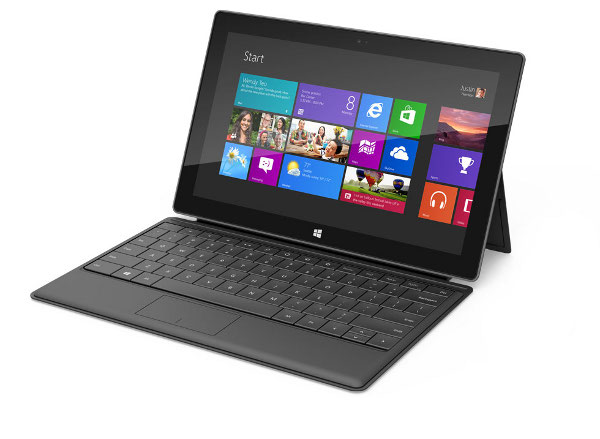
Microsoft Surface gets a positive response from this Windows developer
After seeing the latest information about Microsoft's new Surface tablet computers and also reading Joe Wilcox's latest article about them, I finally get Microsoft's mindset -- and I am impressed. So what does this Windows developer think of Surface? Need a tablet to appreciate what it is all about.
I don't have deep pockets, so I try to use my computers as long as possible, but after hearing about Windows 8, I knew I needed to get a tablet as soon as possible. Something big was afoot! Fortunately Microsoft made is easier for me when the Microsoft Store had an amazing deal on an ExoPC Windows tablet for only $399. I jumped on that deal, and I think it was the right one.
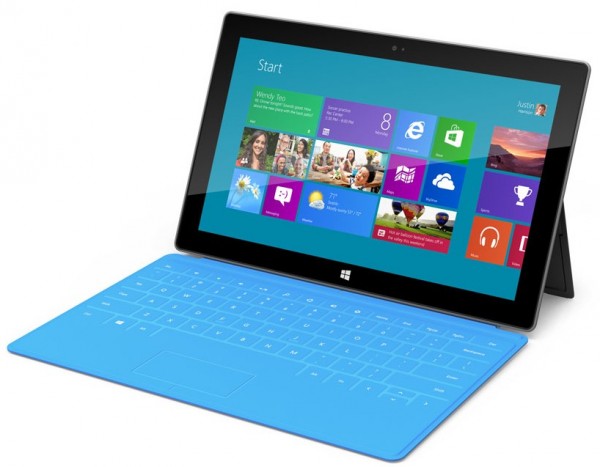
Surface is Project Origami's revenge
Surface isn't just about the future. The tablet is also about the past, and Microsoft bringing to market a vision quashed by its hardware partners. In 2012, Surface is all about Apple and Microsoft securing a fast foothold in the emerging cloud-connected device category. But the tablet also encompasses something sought six years ago: Project Origami.
It's no coincidence that Project Origami's launch was, until yesterday, the last time Microsoft held a super-secretive media event that generated big buzz. Surface and the other share much in common, and not just buzz. Before there was iPad, Microsoft developed Ultra-Mobile PC -- or what Project Origami came to be branded. The idea: To bring to market a sub-$500 touchscreen computer. The software giant sought this product category four years before iPad stormed the media tablet market. Surface is Project Origami's revenge, against Apple and Microsoft's hardware partners.
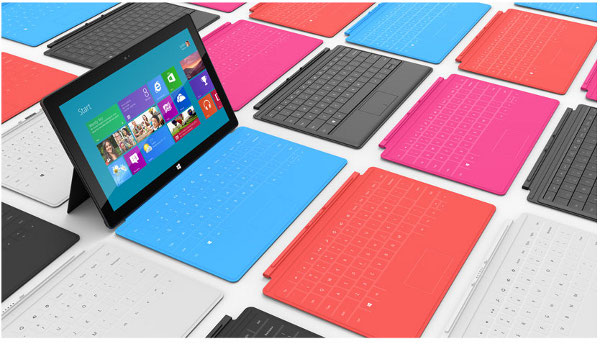
Microsoft Surface is all about Apple
I dunno if it's branding or magic, but Microsoft's "big-ass" Surface table suddenly is smaller. In a jam-packed media event this evening, the software giant unveiled a 10.6-inch display tablet. Case is magnesium with beveled edges that give a sleek appearance. The tablet weighs as little as 676 grams. That's a helluva lot lighter than the Surface table introduced 5 years ago. That baby measured 30 inches and newer Samsung model is 40 inches. The tablet is pretty compact compared to the table.
So the rumors were true about a Microsoft tablet. But Surface? Not Xbox? It's smart branding that pits Microsoft's tablet against Apple's -- industrial design, announcement timing, Surface branding and more.
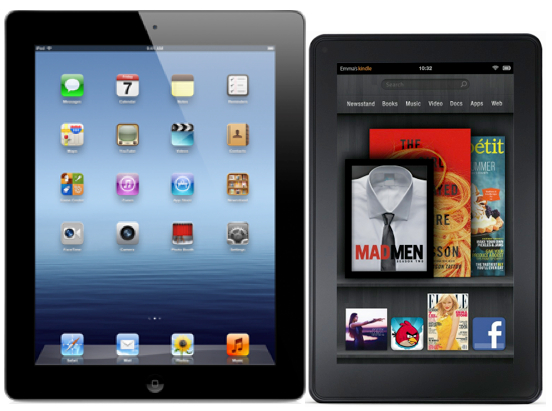
Would you believe Android tablet adoption is even with iPad?
I surely don't. Perhaps even I am too influenced by all the pro-Apple propaganda. But the figures come from a reasonably reliable source, Online Publishers Association, which puts US iPad adoption at 52 percent and Android at 51 percent. Okay, I'll pause so you can wipe off coffee, or whatever else just spit out, from your computer screen.
The numbers don't add up to 100 percent, because some people own more than one type of tablet. Android gains largely come from Kindle Fire, which share is 32 percent -- four times new iPad and one point more than the original. Year over year, overall Android penetration rose from 32 percent, while iPad's fell from 72 percent. Perhaps it's no coincidence Android rose by 19 points and iPad fell by 20.
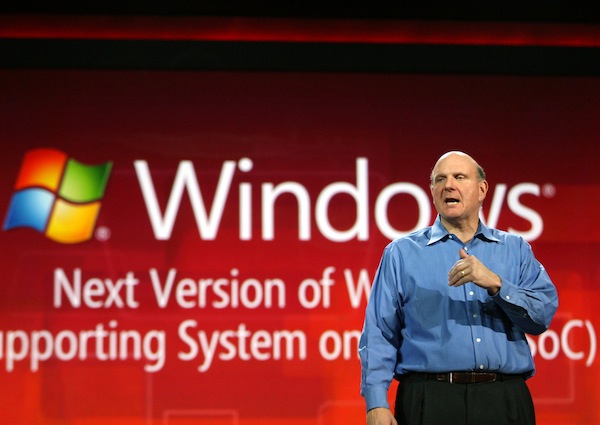
Should Microsoft release a branded tablet?
It's Microsoft mystery Monday, with some big announcement coming at 6:30 pm EDT. The current rumors all focus on tablets, with the most recent being a partnership with Barnes & Noble. Can you say Windows Nook? (However, after I posted, Barnes & Noble issued a non-participation statement).
There's a broader question: Should Microsoft release a branded tablet? I pose that to you on this fine day. I'm certainly perplexed. The big advantage to such an announcement is timing. Google is expected to debut its own branded Galaxy Nexus tablet at the I/O developer conference next week. Microsoft could steal Google's thunder by doing something first. But would it be, with Windows 8 still in development? Now it would be big if Microsoft said Windows RT is ready now and this tablet , whether made by Barnes & Noble or somebody else, ships imminently. Otherwise, why bother announce June 18, when OEM partners showed off Windows RT models earlier this month at Computex?
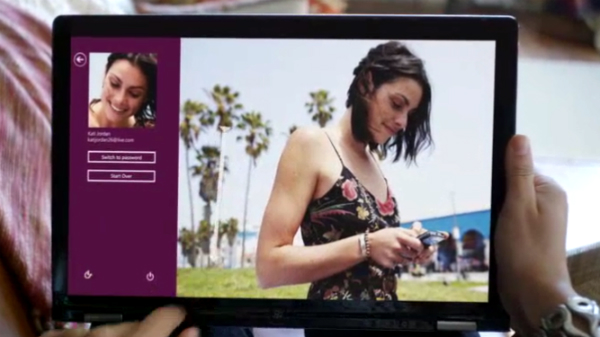
Windows 8 is like a bad blind date
She's stunning, sexy and sultry. But you can't live with her.
Every day for the last three weeks, I sat down to write this analysis but couldn't bring myself to. I resisted for not having used Windows 8 as much as its predecessors -- typically from public beta to release candidate before offering hard opinion. In October, I requested one of the Samsung tablets handed out to BUILD attendees but Microsoft wouldn't provide one. After several more requests, I got one in April and May for about a month's use and was shocked -- and not "wow, it's good". Windows 8 demos much better than my actual user experience. I blamed myself. Surely the problem is mine -- that Microsoft wouldn't unleash UX worse than Windows Vista. But as I see other users/reviewers sharing similar experience, time has come to break my silence. I wouldn't recommend Windows 8, in its current form, to anyone.
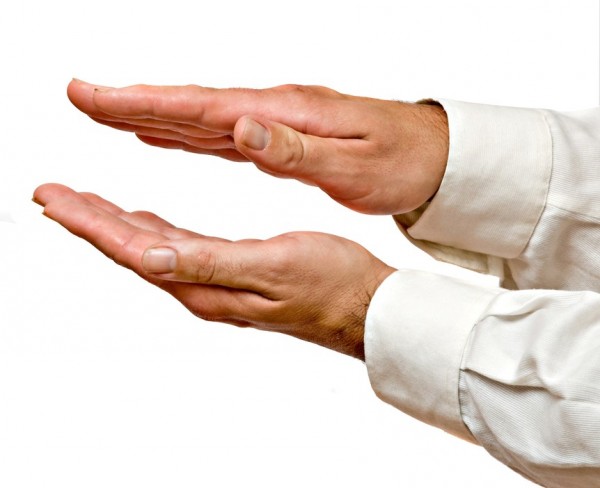
Will Microsoft's mystery product be 'clap on, clap off' for mobile?
Cue up the rumormill for anyone's guess what Microsoft will announce at 6:30 pm EDT on Monday. I'll throw out one, inspired by software developer Robert Johnson, who occasionally writes for BetaNews (and we wish it was more often).
"If Mashable is correct and Microsoft really is gonna announce a self-manufactured tablet then it could possibly be a further refinement of the laptop that was rumored a few months ago", he speculated. "Remember how there were reports of people who had seen a device made by Asus that contained Kinect cameras?" Yes I do, and replied: "Kinect mobile has limited applications, but they're big for key enterprise markets, such as healthcare. Otherwise what have you got? 'Clap on, clap off' for PCs".

Apple cofounder calls Siri 'poo-poo'
It's another dress-down Friday here at BetaNews, and how could I resist dressing down Apple's Siri when cofounder Steve Wozniak makes doing so easy? Besides, I've already asserted "Siri sucks", then there is that lawsuit about the voice assistant. Speaking of Apple legal wranglings, who needs enemies when you've got friends like Woz. Surely the lawyers behind that lawsuit are drooling all over the Times Union, where the comments appeared.
Apple's misfortune: Wozniak used Siri before the iPhone maker bought the company, and he really liked the technology. He called it "pretty incredible". But no longer. "A lot of people say Siri. I say poo-poo". He gives an example. Before Apple bought Siri: "I would ask 'What are the prime numbers greater than 87?' and they would come up all in a row". Afterwards: "I'd say 'What are the prime numbers greater than 87?' And I'd get prime rib".
